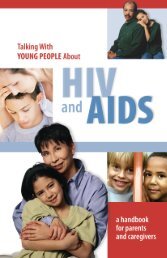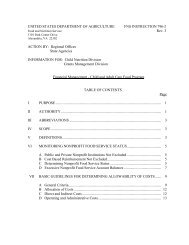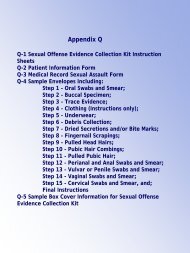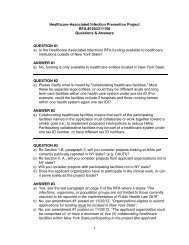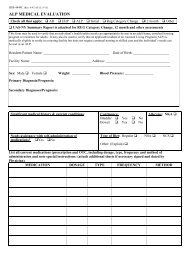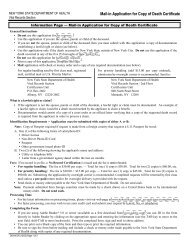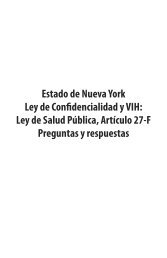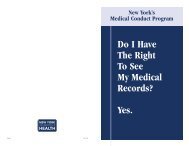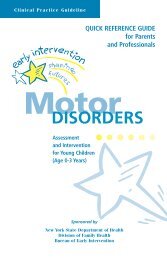HIV: The Basics
HIV: The Basics
HIV: The Basics
You also want an ePaper? Increase the reach of your titles
YUMPU automatically turns print PDFs into web optimized ePapers that Google loves.
CHAPTER 1<br />
<strong>HIV</strong>:<br />
<strong>The</strong> <strong>Basics</strong><br />
Contents<br />
Page<br />
What is <strong>HIV</strong>? ............................................................................................ 1-2<br />
How is <strong>HIV</strong> spread? ................................................................................ 1-2<br />
How does <strong>HIV</strong> affect a person’s health? ................................................ 1-3<br />
How do people know they have <strong>HIV</strong>? .................................................... 1-4<br />
How does <strong>HIV</strong> attack a person’s immune system?................................ 1-5<br />
How is my child’s immune system watched? ......................................... 1-7<br />
What are the goals in treating <strong>HIV</strong>? ..................................................... 1-10<br />
How do medicines slow down or stop <strong>HIV</strong>? ........................................ 1-11<br />
Which <strong>HIV</strong> medicines are best to take? ............................................... 1-12<br />
Why do <strong>HIV</strong> medicines stop working? ................................................. 1-12<br />
How are some infections and illnesses prevented or treated? ............ 1-14<br />
What other illnesses or problems do children<br />
with <strong>HIV</strong> sometimes get? ...................................................................... 1-15<br />
How are scientists finding new treatments for <strong>HIV</strong>?........................... 1-17<br />
<strong>HIV</strong>: <strong>The</strong> <strong>Basics</strong> 1–1<br />
9/03
<strong>HIV</strong> is a virus that<br />
hurts the body's<br />
immune system.<br />
What is <strong>HIV</strong>?<br />
<strong>HIV</strong> (Human Immunodeficiency Virus) is a virus<br />
that attacks the immune system. (<strong>The</strong> immune<br />
system fights infections and diseases in a person's<br />
body.) Over time, <strong>HIV</strong> weakens a person's immune<br />
system so it has a very hard time fighting diseases.<br />
<strong>HIV</strong> causes AIDS (Acquired Immune Deficiency<br />
Syndrome). People with <strong>HIV</strong> can have it for many<br />
years before it develops into AIDS.<br />
It is not who you<br />
are. It is what<br />
you do that puts<br />
you at risk for<br />
getting <strong>HIV</strong>.<br />
How is <strong>HIV</strong> spread?<br />
<strong>HIV</strong> is passed from person to person. This happens<br />
when a person with <strong>HIV</strong> gets his/her blood, semen,<br />
vaginal fluid, or breast milk inside another person's<br />
body. <strong>The</strong>re is no risk of getting <strong>HIV</strong> from the<br />
person's urine, sweat, tears, saliva, or vomit unless<br />
there is also blood in it.<br />
A person of any age, sex, ethnic group, religion,<br />
economic background, or sexual orientation can get<br />
<strong>HIV</strong>. It is not who you are. It is what you do that<br />
puts you at risk. Anyone who shares needles, shares<br />
works to inject drugs, or has unprotected sex (sex<br />
without a condom) with someone who has <strong>HIV</strong> is at<br />
very high risk for getting infected. A mother with<br />
<strong>HIV</strong> can also pass the virus to her baby during<br />
pregnancy, during birth, or by breast feeding.<br />
It is not possible to tell if people have <strong>HIV</strong> by<br />
looking at them. People can have <strong>HIV</strong> for many<br />
years and not know they have it. <strong>The</strong>y can also pass<br />
1–2 <strong>HIV</strong>: <strong>The</strong> <strong>Basics</strong><br />
9/03
it to others without knowing it. That is why it is so<br />
important for people to get tested to find out if they<br />
have <strong>HIV</strong>.<br />
People with <strong>HIV</strong> who look and feel healthy, or have<br />
very low or undetectable (un dë tekt´ i bul) levels of<br />
virus, can still pass <strong>HIV</strong> to others.<br />
(See <strong>HIV</strong>: <strong>The</strong> <strong>Basics</strong>, How is my child’s immune<br />
system watched? Measuring the amount of <strong>HIV</strong> in<br />
your child’s blood: viral load, page 1–8.)<br />
How does <strong>HIV</strong><br />
affect a person's health?<br />
When people first get infected with <strong>HIV</strong>, they may<br />
or may not feel sick. Some get flu-like symptoms<br />
(simp´ toms), they may get a fever, sore throat,<br />
swollen glands, or a skin rash. <strong>The</strong>se symptoms will<br />
go away without treatment, but <strong>HIV</strong> stays in their<br />
blood where it grows and begins to destroy their<br />
immune system. People with <strong>HIV</strong> can have it for<br />
many years before their immune system gets weak<br />
and other symptoms appear. After symptoms<br />
appear, people with <strong>HIV</strong> will feel better with<br />
treatment. People with <strong>HIV</strong> may get sick more often<br />
and have illnesses that are harder to treat than<br />
people who do not have <strong>HIV</strong>. Sometimes people<br />
with <strong>HIV</strong> may get very sick.<br />
People who have<br />
<strong>HIV</strong> may not have<br />
any symptoms<br />
for years.<br />
<strong>HIV</strong>: <strong>The</strong> <strong>Basics</strong> 1–3<br />
9/03
Infants who were born with <strong>HIV</strong> or got <strong>HIV</strong> from<br />
their mother's breast milk may have symptoms<br />
that include:<br />
■<br />
■<br />
■<br />
■<br />
■<br />
■<br />
■<br />
■<br />
slow to grow and gain weight.<br />
slow learning to walk and talk.<br />
frequent diarrhea (dï a rë´ a).<br />
swollen glands.<br />
yeast infections (thrush).<br />
enlarged liver and spleen.<br />
pneumonia (nü mö´ në a), a lung infection.<br />
other infections that healthy children do not<br />
usually get.<br />
Infants with <strong>HIV</strong> may get sick more often and have<br />
illnesses that are harder to treat than other infants.<br />
<strong>The</strong>re are tests<br />
that show if<br />
someone has <strong>HIV</strong>.<br />
How do people<br />
know they have <strong>HIV</strong>?<br />
<strong>HIV</strong> is most often diagnosed (dï ag nöst´) in adults<br />
and in children over 2 years old by tests that look for<br />
<strong>HIV</strong> antibodies (an´ të bod ëz). <strong>HIV</strong> antibodies are<br />
substances the immune system makes to fight <strong>HIV</strong>.<br />
If the test finds <strong>HIV</strong> antibodies, the test result is <strong>HIV</strong><br />
positive. This means the person has <strong>HIV</strong>.<br />
At birth, all infants will have <strong>HIV</strong> antibodies in their<br />
blood if their mothers have <strong>HIV</strong>. Until infants are 6<br />
to 18 months old, they have their mother’s <strong>HIV</strong><br />
antibodies. To find out if an infant has <strong>HIV</strong>, a blood<br />
1–4 <strong>HIV</strong>: <strong>The</strong> <strong>Basics</strong><br />
9/03
test called a PCR (polymerase chain reaction) is<br />
done. A PCR test is different from an <strong>HIV</strong> antibody<br />
test. Rather than look for <strong>HIV</strong> antibodies, a PCR test<br />
looks for <strong>HIV</strong> in an infant's blood. In almost every<br />
case, the test can tell if the infant has <strong>HIV</strong> by the<br />
time he/she is between 1 and 4 months old. If <strong>HIV</strong><br />
is found, the PCR test will be positive. This means<br />
the infant has <strong>HIV</strong>.<br />
Special Note for Foster Parents:<br />
Make sure to keep your caseworker informed about<br />
follow-up doctor visits for PCR testing.<br />
How does <strong>HIV</strong> attack a<br />
person’s immune system?<br />
When <strong>HIV</strong> gets inside a person’s body, it attacks<br />
his/her immune system. (<strong>The</strong> immune system fights<br />
infections and diseases.) <strong>The</strong> immune system has<br />
many kinds of white blood cells to fight infections.<br />
<strong>HIV</strong> finds the white blood cells, called CD4 cells.<br />
<strong>HIV</strong> gets inside the CD4 cell and makes copies of<br />
itself. <strong>The</strong>n, <strong>HIV</strong> kills the CD4 cell and the new <strong>HIV</strong><br />
copies find other CD4 cells to get inside and start<br />
the cycle again.<br />
<strong>The</strong> immune system tries to control <strong>HIV</strong> by making<br />
more CD4 cells. But when the immune system<br />
cannot make CD4 cells fast enough, the amount of<br />
virus in the body goes up and the number of CD4<br />
cells goes down. Because the immune system can<br />
no longer control <strong>HIV</strong>, the person can become sick.<br />
A weak immune system has a hard time fighting<br />
<strong>HIV</strong> kills immune<br />
system cells that<br />
help the body<br />
fight infections<br />
and diseases.<br />
<strong>The</strong> immune<br />
system becomes<br />
weak when it<br />
cannot make<br />
enough CD4 cells<br />
to fight <strong>HIV</strong>.<br />
<strong>HIV</strong>: <strong>The</strong> <strong>Basics</strong> 1–5<br />
9/03
germs, even the germs that are around us all the<br />
time. <strong>The</strong>se infections might last longer, be more<br />
severe, and return more often in someone with a<br />
weak immune system.<br />
<strong>The</strong> picture below shows what happens in your<br />
child's body when <strong>HIV</strong> attacks your child’s immune<br />
system. Think of the running water as <strong>HIV</strong> making<br />
copies of itself. Think of the drain as the immune<br />
system (CD4 cells) working to get rid of the virus.<br />
<strong>The</strong> clogged drain, or weak immune system, cannot<br />
get rid of <strong>HIV</strong> fast enough. <strong>The</strong> water goes up in the<br />
sink just the way the amount of <strong>HIV</strong> can go up in<br />
your child's blood. When this happens, your child<br />
has a high viral load.<br />
Adapted from “Your Child, Your Family, and <strong>HIV</strong>” published by<br />
the National Pediatric & Family <strong>HIV</strong> Resource Center at the<br />
University of Medicine and Dentistry of New Jersey.<br />
1–6 <strong>HIV</strong>: <strong>The</strong> <strong>Basics</strong><br />
9/03
How is my child's<br />
immune system watched?<br />
You and your child's doctor(s) will watch your child's<br />
health in many ways. Your child's doctor will look<br />
for signs and symptoms of infections or other<br />
problems by ongoing health check-ups and blood<br />
tests. <strong>The</strong>se will tell the doctor if the <strong>HIV</strong> is getting<br />
stronger or weaker. <strong>The</strong>y will also help the doctor<br />
find a problem early when it may be easier to treat.<br />
Your child's doctor<br />
will use ongoing<br />
check-ups and<br />
blood tests to watch<br />
your child's health.<br />
Ongoing medical check-ups<br />
Your child's doctor and clinic visits are important.<br />
<strong>The</strong>se visits help the doctor or nurse see how your<br />
child is doing. Ongoing visits also help the doctor or<br />
nurse find health problems when they may be easier<br />
to treat. <strong>The</strong> doctor or nurse will give your child a<br />
physical exam and talk with you and your child, if<br />
old enough, about changes in your child's health and<br />
behavior. He/she will ask you about how your child<br />
is doing at home, day care, or school. He/she will<br />
also ask about changes in your child's eating habits,<br />
sleeping habits, activity level, etc.<br />
Your child's ongoing<br />
health check-ups<br />
are important.<br />
<strong>The</strong>se check-ups<br />
can help the doctor<br />
or nurse find health<br />
problems when<br />
they may be easier<br />
to treat.<br />
Whenever you see a sudden change in your child's<br />
behavior, call the doctor. A sudden change may<br />
mean that your child needs help for a physical or<br />
mental problem.<br />
Special Note for Foster Parents:<br />
As noted above, if you see sudden changes in your<br />
foster child's behavior, call the doctor and keep your<br />
caseworker informed.<br />
<strong>HIV</strong>: <strong>The</strong> <strong>Basics</strong> 1–7<br />
9/03
Your child will get<br />
blood tests from<br />
time to time to<br />
measure how<br />
much virus is in<br />
his/her blood.<br />
Measuring the amount of <strong>HIV</strong><br />
in your child's blood: viral load<br />
One of the goals of treating <strong>HIV</strong> is to keep the<br />
amount of virus in your child's body as low as<br />
possible. To see how much virus is in your child's<br />
blood, a viral load test will be done from time to<br />
time. Based on the test result, the doctor will know:<br />
■<br />
■<br />
■<br />
if medicine is needed to help control <strong>HIV</strong>.<br />
if the medicine already being taken is<br />
controlling <strong>HIV</strong>.<br />
if other medicine is needed to control <strong>HIV</strong>.<br />
<strong>The</strong> test information will help the doctor suggest<br />
treatment options. When your child has a very low<br />
or undetectable viral load, he/she may not feel sick<br />
at all or may have fewer serious infections and<br />
illnesses related to <strong>HIV</strong>.<br />
Anyone with <strong>HIV</strong>, even if they have a low<br />
or undetectable viral load, can still pass<br />
<strong>HIV</strong> to others if their blood, semen, vaginal<br />
fluids, or breast milk get inside another<br />
person's body.<br />
Your child will also<br />
have blood tests<br />
done from time to<br />
time to check<br />
his/her immune<br />
system.<br />
Measuring your child's<br />
immune system: CD4 cell counts<br />
Another way to see how well your child is doing is to<br />
check the number of CD4 cells he/she has. <strong>The</strong> CD4<br />
cell blood test tells the doctor if your child's immune<br />
system is weak or strong. If his/her immune system<br />
is weak, the doctor may suggest medicines to help<br />
prevent some serious infections.<br />
By looking at both viral load and CD4 cell numbers,<br />
the doctor can find out a lot about your child's health.<br />
1–8 <strong>HIV</strong>: <strong>The</strong> <strong>Basics</strong><br />
9/03
Checking your child's blood<br />
A complete blood count (CBC) is usually done at<br />
each doctor or clinic visit. <strong>The</strong> CBC is a blood test<br />
that counts the number of your child's red blood<br />
cells, white blood cells, and platelets.<br />
■<br />
■<br />
■<br />
Red blood cells carry oxygen to cells in the<br />
child's body.<br />
White blood cells fight infections.<br />
Platelets help control bleeding.<br />
Changes in your child's blood count can be caused<br />
by many things, such as <strong>HIV</strong>, another infection, or<br />
by a side effect from medicines.<br />
Checking your child's other body systems<br />
Other blood tests will be done from time to time to<br />
see how well your child's kidneys, liver, and other<br />
body systems are working.<br />
If your child has a health problem that cannot be<br />
diagnosed with blood tests, other tests may be<br />
needed. X-rays, ultrasounds, CT scans<br />
(computerized tomography), MRIs (magnetic<br />
resonance imaging), and PETs (positron emission<br />
tomography) are tests that show the doctor what is<br />
going on inside your child's body.<br />
Your child’s doctor<br />
may have other<br />
tests done to find<br />
out the cause of a<br />
health problem.<br />
<strong>HIV</strong>: <strong>The</strong> <strong>Basics</strong> 1–9<br />
9/03
What are the<br />
goals in treating <strong>HIV</strong>?<br />
<strong>The</strong> goals in treating <strong>HIV</strong> are to:<br />
■<br />
■<br />
lower the amount of virus in your child's blood.<br />
increase the number of CD4 cells in your child's<br />
immune system.<br />
<strong>The</strong> sinks below may help show how <strong>HIV</strong> treatment<br />
works. Think of the running water as <strong>HIV</strong> making<br />
copies of itself. Think of the drain as the immune<br />
system (CD4 cells) working to get rid of the virus.<br />
Adapted from “Your Child, Your Family, and <strong>HIV</strong>” published by the National Pediatric & Family <strong>HIV</strong><br />
Resource Center at the University of Medicine and Dentistry of New Jersey.<br />
1–10 <strong>HIV</strong>: <strong>The</strong> <strong>Basics</strong><br />
9/03
<strong>The</strong> drain on the left shows <strong>HIV</strong> making many<br />
copies of itself. <strong>The</strong> clogged drain, or weak immune<br />
system, cannot get rid of <strong>HIV</strong> fast enough. <strong>The</strong><br />
water goes up in the sink just the way the amount of<br />
<strong>HIV</strong> can go up in your child's blood. When this<br />
happens, your child has a high viral load.<br />
<strong>The</strong> drain on the right shows what happens when<br />
<strong>HIV</strong> treatment is working. <strong>HIV</strong> stops or slows down<br />
making copies of itself. <strong>The</strong> unclogged drain, or<br />
strong immune system, can get rid of <strong>HIV</strong>. So the<br />
water goes down in the sink just the way the amount<br />
of <strong>HIV</strong> can go down in your child's blood. When this<br />
happens, your child has a low or undetectable<br />
viral load.<br />
How do medicines<br />
slow down or stop <strong>HIV</strong>?<br />
Experts have made medicines that work to stop <strong>HIV</strong><br />
from getting inside white blood cells (CD4 cells) or<br />
work to stop <strong>HIV</strong> from making copies of itself.<br />
<strong>The</strong>se medicines are called antiretrovirals<br />
(an tï´ ret rö´ vï rals). “Anti” means against, and<br />
“retro viral” means the virus. Antiretroviral<br />
medicines can lower the amount of <strong>HIV</strong> in your<br />
child's blood. When the amount of <strong>HIV</strong> in your<br />
child's blood is low, it is much harder for <strong>HIV</strong> to<br />
make copies of itself. This means:<br />
Antiretroviral<br />
medicines can<br />
slow or stop <strong>HIV</strong><br />
from making<br />
copies of itself.<br />
■<br />
■<br />
■<br />
your child's medicines are working.<br />
your child's immune system is stronger.<br />
your child will have fewer illnesses.<br />
<strong>HIV</strong>: <strong>The</strong> <strong>Basics</strong> 1–11<br />
9/03
<strong>The</strong> doctor will<br />
recommend<br />
antiretroviral<br />
medicines that are<br />
best for your child.<br />
Which medicines are best to take?<br />
In the beginning, there was only one medicine to<br />
fight <strong>HIV</strong>. So there was no choice about what<br />
medicine to take. Now, there are many medicines,<br />
and it is harder to decide. A group of <strong>HIV</strong> experts<br />
looked at all the research studies and came up with<br />
guidelines or plans. <strong>The</strong>se plans help your child's<br />
doctor decide which medicines are best for your<br />
child.<br />
Deciding which medicines are best for your child<br />
depends on his/her:<br />
■<br />
■<br />
■<br />
■<br />
■<br />
past and present medical problems.<br />
antiretroviral medicines taken in the past.<br />
ability to take each medicine on time.<br />
ability to take medicine in liquid, pill or powder<br />
form.<br />
ability to deal with the way the medicine tastes or<br />
feels in his/her mouth.<br />
<strong>HIV</strong> will try to<br />
change itself so it<br />
can grow stronger.<br />
Why do <strong>HIV</strong><br />
medicines stop working?<br />
<strong>HIV</strong> is very smart. If given a chance, <strong>HIV</strong> will try to<br />
grow stronger. <strong>HIV</strong> will grow stronger very quickly<br />
when your child's:<br />
1–12 <strong>HIV</strong>: <strong>The</strong> <strong>Basics</strong><br />
9/03
■<br />
■<br />
■<br />
<strong>HIV</strong> medicines are not taken correctly.<br />
<strong>HIV</strong> medicine doses are missed.<br />
<strong>HIV</strong> medicines do not work.<br />
When <strong>HIV</strong> grows stronger, your child's <strong>HIV</strong><br />
medicine may stop working. <strong>HIV</strong> may be resistant<br />
(rë zis´ tant) to the <strong>HIV</strong> medicines your child takes.<br />
This means:<br />
■<br />
■<br />
■<br />
■<br />
your child's medicines can no longer control<br />
<strong>HIV</strong>.<br />
<strong>HIV</strong> will make more copies of itself.<br />
your child's immune system will become weaker.<br />
your child may have more infections and<br />
illnesses.<br />
Remember the running water and clogged<br />
drain on page 1-6. <strong>The</strong> clogged drain, or<br />
weak immune system, cannot get rid of <strong>HIV</strong><br />
fast enough. <strong>The</strong> water goes up in the sink<br />
just the way the amount of virus goes up in<br />
your child's blood.<br />
Taking medicines everyday can be very hard. But<br />
for the medicines to do their best to control <strong>HIV</strong>, it is<br />
important for your child to take every <strong>HIV</strong> medicine<br />
dose correctly and on time.<br />
Your child's doctor or nurse should be called if there<br />
is a problem taking any of the medicines. You, your<br />
child, and your child's doctor or pharmacist<br />
(far´ ma sist) can work together to get the best<br />
medicine schedule for your child.<br />
If your child has a<br />
problem taking<br />
any of the<br />
medicines as<br />
directed, call the<br />
doctor or nurse.<br />
<strong>HIV</strong>: <strong>The</strong> <strong>Basics</strong> 1–13<br />
9/03
Special Note for Foster Parents:<br />
If your foster child has a problem taking any of his/her<br />
medicines, call the doctor or nurse and your caseworker.<br />
Some medicines<br />
can help prevent<br />
illnesses before<br />
they start.<br />
A child with <strong>HIV</strong><br />
who has a weak<br />
immune system<br />
may get infections<br />
and illnesses that<br />
healthy children<br />
do not get.<br />
How are some infections and<br />
illnesses prevented or treated?<br />
<strong>The</strong> best thing to do is prevent problems before they<br />
start. Sometimes, this can be done by giving your<br />
child medicines before an illness starts. Whether or<br />
not a preventive medicine is given depends on your<br />
child's health and immune system. Many times,<br />
your child's CD4 cell count is used to help decide if<br />
preventive medicine is needed and when to start.<br />
Preventive medicines may be used for illnesses<br />
such as PCP (Pneumocystis carinii pneumonia),<br />
MAC (Mycobacterium avium complex), herpes<br />
(her´ pëz), and thrush.<br />
A child with a very weak immune system may need<br />
help to fight:<br />
■<br />
■<br />
serious infections, such as a lung infections<br />
(pneumonia), blood infections (sepsis), and sinus<br />
infections (sinusitis).<br />
measles.<br />
1–14 <strong>HIV</strong>: <strong>The</strong> <strong>Basics</strong><br />
9/03
What other illnesses or problems do<br />
children with <strong>HIV</strong> sometimes get?<br />
Children with <strong>HIV</strong> may get illnesses or have<br />
problems caused by:<br />
■<br />
■<br />
■<br />
<strong>HIV</strong>.<br />
a weak immune system.<br />
medicines.<br />
Anemia<br />
Anemia (a në´ më a) is common for children with<br />
<strong>HIV</strong>. Children are anemic (a në´ mik) when the<br />
number of their red blood cells fall below normal.<br />
Red blood cells are important because they carry<br />
oxygen to different parts of the body. Children who<br />
are anemic may be tired and pale or have no<br />
symptoms at all. Anemia is diagnosed by a blood<br />
test. Children most often become anemic from a low<br />
iron level, or from one of the antiretroviral<br />
medicines they are taking. If the anemia is caused<br />
by antiretroviral medicines, the doctor may treat the<br />
anemia by changing the medicine. If the anemia is<br />
caused by low iron levels, the doctor will treat it with<br />
iron vitamins.<br />
Herpes simplex virus<br />
Herpes simplex virus is also common among<br />
children with <strong>HIV</strong>. This virus causes common cold<br />
sores. <strong>The</strong> herpes simplex virus causes painful sores<br />
in and around the mouth of a child with <strong>HIV</strong>.<br />
Sometimes, when first infected with the herpes<br />
simplex virus, or when a child's immune system is<br />
<strong>HIV</strong>: <strong>The</strong> <strong>Basics</strong> 1–15<br />
9/03
weak, this virus can cause many painful blisters<br />
and a fever. <strong>The</strong> sores often make it difficult to eat<br />
and swallow. Herpes simplex virus can be treated,<br />
but may also come back. Usually when the<br />
infection returns, there are fewer sores in and<br />
around the child's mouth.<br />
LIP<br />
LIP (lymphocytic interstitial pneumonitis) is a<br />
serious lung disease that starts with shortness of<br />
breath, wheezing and coughing. <strong>The</strong> cause of LIP<br />
is not known. A chest X-ray may help the doctor<br />
make a diagnosis. LIP is usually treated with<br />
steroid medicines, as well as antiretroviral<br />
medicines to control the <strong>HIV</strong>. With treatment, LIP<br />
will improve greatly.<br />
Shingles<br />
Shingles are caused by the same virus as chicken<br />
pox. After having chicken pox, the virus can come<br />
back months or years later anywhere in the body and<br />
is often very painful. On a small area of the body,<br />
the skin breaks out in a rash or small blisters much<br />
like the chicken pox. Inside these little blisters is the<br />
chicken pox virus. Chicken pox can be spread to<br />
another person who has not had the chicken pox by<br />
touching these blisters. Shingles usually go away in<br />
1 - 2 weeks but can last longer and be more severe<br />
when the child's immune system is weak. Shingles<br />
can come back either at the same place or a different<br />
place on a child's body.<br />
1–16 <strong>HIV</strong>: <strong>The</strong> <strong>Basics</strong><br />
9/03
Fat redistribution<br />
Fat redistribution or lipodystrophy (lip ö dis´ trö fë)<br />
is a change in the way a person's body stores fat.<br />
<strong>The</strong>se changes may include:<br />
■<br />
■<br />
losing fat in a person's face, arms and legs.<br />
gaining fat in a person's stomach or at the base of<br />
his/her neck.<br />
<strong>The</strong> cause of lipodystrophy is still being studied. If<br />
lipodystrophy is bothering your child, talk to your<br />
child's doctor.<br />
How are scientists finding<br />
new treatments for <strong>HIV</strong>?<br />
New medicines for<br />
treating <strong>HIV</strong> are<br />
being tested in<br />
clinical trials.<br />
Scientists are still working hard to find new<br />
treatments and a cure for <strong>HIV</strong>. Research studies<br />
called clinical trials test new medicines and<br />
combinations of medicines to see which ones work<br />
the best and which ones are the safest. <strong>The</strong>se<br />
studies are offered by the AIDS Clinical Trials<br />
Group (ACTG). Without clinical trials, there would<br />
be no medicines to fight <strong>HIV</strong>. Medicines that are<br />
studied in clinical trials are used very carefully.<br />
Before anyone can be in a clinical trial, he/she must<br />
fit the study requirements. Once in the study, the<br />
person must agree to follow the rules of the study.<br />
A person can stop a clinical trial at any time if he/she<br />
does not want to continue.<br />
As a parent or guardian, you must give permission<br />
for your child to be in a clinical trial. Again, the<br />
medicine and the study can be stopped if you feel<br />
<strong>HIV</strong>: <strong>The</strong> <strong>Basics</strong> 1–17<br />
9/03
the medicine is not helping or hurting your child.<br />
No matter if your child is in a clinical trial or not,<br />
good medical care will be given to him/her.<br />
Special Note for Foster Parents:<br />
A foster parent cannot consent to his/her foster child<br />
joining a clinical trial. Call your caseworker about<br />
getting consent.<br />
Notes<br />
_____________________________________________________________________________<br />
_____________________________________________________________________________<br />
_____________________________________________________________________________<br />
_____________________________________________________________________________<br />
_____________________________________________________________________________<br />
_____________________________________________________________________________<br />
_____________________________________________________________________________<br />
_____________________________________________________________________________<br />
_____________________________________________________________________________<br />
_____________________________________________________________________________<br />
_____________________________________________________________________________<br />
_____________________________________________________________________________<br />
_____________________________________________________________________________<br />
_____________________________________________________________________________<br />
_____________________________________________________________________________<br />
1–18 <strong>HIV</strong>: <strong>The</strong> <strong>Basics</strong><br />
9/03



